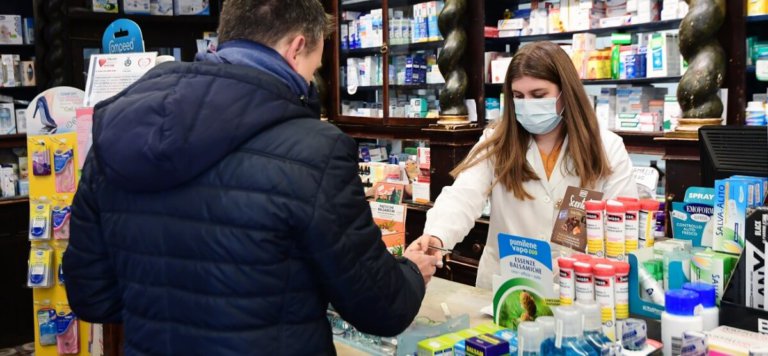
Concerns are rife over the automation of jobs in the future of work. But as technology grows in sophistication and is embraced across businesses, some roles within the healthcare ecosystem are less likely to feel the sting of automation.
As technology continues to evolve, so will the role of healthcare professionals, including pharmacists.
Pharmacists are medicine specialists; they gallantly serve as gatekeepers within the healthcare ecosystem in ensuring patients are given the right medication.
As professionals who play an important role in safeguarding patients, it’s inevitable that technology will affect how pharmacists perform their job. But rather than a hindrance, technology can complement the profession.
AI will make the role of a pharmacist less technical

Technology’s impact will also affect pharmacy in a myriad of ways. Source: Shutterstock
In an email interview with Study International, Associate Professor at the University of Waterloo, Canada’s School of Pharmacy Kelly Grindrod notes that advances in automation will continue to impact pharmacy.
“Automation is inevitable,” said the pharmacist of 15 years, who is also researching how technology is being used to improve how pharmacists, physicians and patients communicate about medications.
“Pharmacists do much more than simply count and dispense pills. Automation will replace the technical aspects of the job and free pharmacists to actually do what they are trained to do – ensure patients are taking the safest and most effective medications, and only the medications that they would actually benefit from.”
Technology’s impact will affect pharmacy in a myriad of ways. For example, AI will be helpful in areas such as identifying important drug interactions.
As pharmacists have systems that alert them of every possible drug interaction, it’s common for pharmacists and prescribers to experience alert fatigue.
“They see so many alerts that when the important interaction finally comes up, they flip right past it without thinking because they already flip past dozens of unimportant ones every hour,” said the academic.
Grindrod believes AI is needed to identify which interactions are unimportant and which ones need action.
“Pharmacy is in a unique position in that most pharmacists are far overtrained for the highly technical job that they are hired to do.
“Unlike many industries, I think pharmacists are already very ready for disruption, as many disruptions will free them from technical tasks to actually use their expertise to help their primary customer – their patients.”
But in light of rapid technological advances, how are pharmacy students being prepared for the future workforce?
“In Canada, we’ve developed a national informatics programme to help future pharmacists embrace technological changes,” she explained.
The topic of technology in pharmacy is rapidly evolving, and they recognise the importance of staying ahead of the innovations.
Some of the critical topics include the privacy expectations when using technologies, how technologies can support and challenge relationships with patients, and the many trends and hypes that come and go, she said.
Future-proofing pharmacists
In light of all these developments, what can aspiring pharmacists or pharmacy graduates do to ensure they remain relevant in the future of work?
Postgraduate studies may be an important consideration.
“Postgraduate training in technology and informatics is getting more popular among pharmacy graduates, including areas such as user experience and human factors,” said Grindrod.
For instance, a number of universities offer postgraduates degrees in health informatics, including Waterloo, Northwestern University and University College London, to name a few.
The areas of focus between institutions may vary, but they typically aim to equip healthcare professionals with knowledge about information technology and its implementation in healthcare.
She added that many outsiders are trying to be the big disruptor in pharmacy, but they make the mistake of thinking of pharmacists as drug distributors, rather than healthcare providers.
“The pharmacy model can be disrupted, but the pharmacist will always be needed. It’s going to take pharmacists who really understand both pharmacy and technology to make those innovations stick.”
Exciting times ahead for pharmacists?
So, are you keen on studying pharmacy? The job outlook varies depending on your country of residence.
The US Bureau of Labor Statistics said that “the employment of pharmacists is projected to show little or no change from 2018 to 2028. Employment in retail pharmacies will be affected by increasing sales via mail order and online pharmacies”.
However, other countries may have better job prospects, including Australia, Canada and New Zealand, to name a few.
Pharmacists have much to contribute to healthcare, said Grindrod, adding that they can work in “so many jobs beyond the traditional pharmacy”.
For instance, graduates can get involved in research and development, be involved in the manufacturing of drugs or even go into marketing, depending on their interests and personalities.
“Pharmacists are working hard to shake the myth that they are pill counters, and are starting to have real impacts on patient well-being.
“For example, I work in a medical clinic alongside physicians, helping patients and prescribers optimise drug therapies. Many others work in hospitals or for governments, insurers, or pharmaceutical companies. There are so many interesting, innovative, and exciting jobs in this field,” she said.
Liked this? Then you’ll love…
These are the UK’s highest paying and most employable degrees
Degrees that pay the highest graduate salaries in Singapore today







